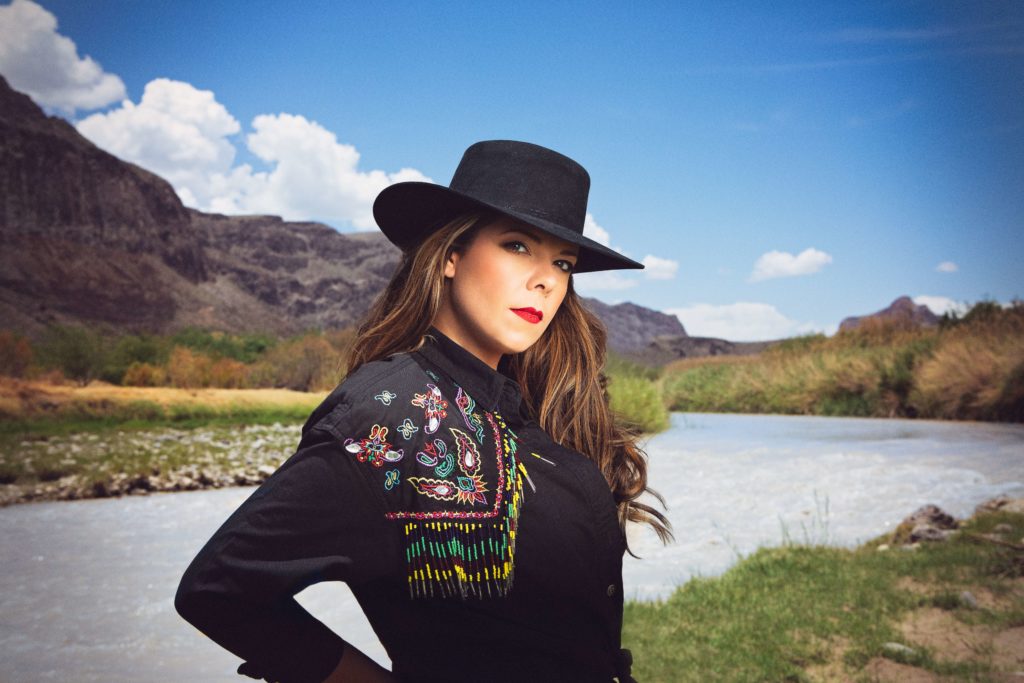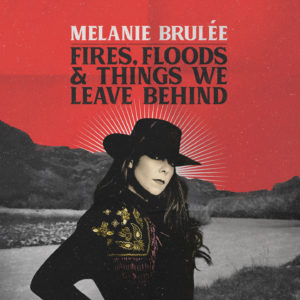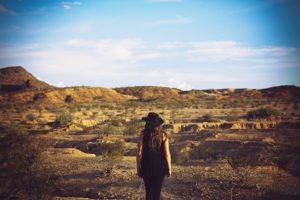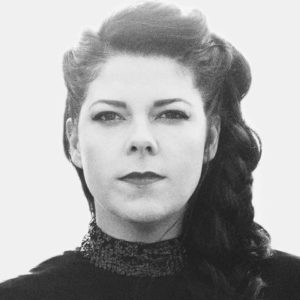
One moment, even as an educated listener, you may think you have Melanie Brulée’s sound pegged. She’s roots/American right? Well, yes and no. Certainly this aspect of the talented Toronto-based singer/songwriter seems to come more to the fore on her new album, Fires, Floods & Things We Leave Behind, which is being released in digital and physical formats on Friday, Oct. 19.
But she is not as simple to pigeonhole as one may think, as her varied live and recording career may suggest. Even with the already loose definition of Americana, Brulée’s songs push that envelope, incorporating delightful throwback sonic motifs that are almost cinematic – hearkening back to the 1960s spaghetti westerns, with a post-modern Tarantino twist. There is sometimes a sultriness, and playfulness to her voice, at other times a fierceness, while other songs she is vulnerable and provocative.
In summation, Brulée is an artist who is as engaging as she is enigmatic, as windswept and interesting as road trip without a map, and as palpably vulnerable at times as she is mightily resilient at others. All of this is meshed together wonderfully with excellent musical compositions, superlative performances from her backing band, and tasteful production, making Fires, Floods & Things We Leave Behind an adventurous journey for the heart, mind and spirit.
There are two interesting and evocative impetuses behind the remarkable songs on Fires, Floods & Things We Leave Behind. One is a road trip that Brulée took with some of her creative pals last year, and another is the ongoing contemplation and introspection over her father’s alcoholism, subsequent suicide and her seeming attraction to people who similarly struggle with the perils and pain of addiction.
The road trip was a cathartic, freeing sojourn, one that started sparking new music and new inspirations from the moment the gaggle of pals left Toronto.
“I was in the midst of writer’s block. I had spent, like three months in Toronto in my apartment just struggling – and mind you it was the winter too. I told myself at the beginning of last year that this is going to be my big year writing. And that is a sure-fire way of not getting anything done, for me, because I put so much pressure on myself. So, it was March and I heard about this road trip that [photographer] Jen Squires, Jadea Kelly and Cindy Doire were taking. They were going on this road trip and just driving across the States to Las Vegas. I hopped on board and then a couple of others did as well, and we ended up as six in total, so I rented an RV online, and we also took a car. We didn’t have much time to stop, it was pretty much just drive and get there. We spent less than 12 hours in Vegas, so It wasn’t even about the destination,” Brulée explained.
 “It was about being out of our comfort zone and seeing different scenery and spending some time out eating good food and having an adventure. The first night the car busted a tire. So, we ended up parking the RV in a Wal Mart parking lot, while the other girls stayed in a dingy hotel. And that night I wrote the song Oklahoma Rain with Cindy. It was an effort to manifest a sexy mechanic to come out and help the three single girls. We were on the border of Oklahoma and Arkansas and I don’t know if sexy mechanics exist around there, but the universe did not get our order for that one. But the point is that right away that first day, songs started getting written and at times I was writing music without even having a guitar in my hand. I could just hear the melody and I was writing lyrics and it was flowing out of me, literally like there was a dam and I took the rock out of the way.
“It was about being out of our comfort zone and seeing different scenery and spending some time out eating good food and having an adventure. The first night the car busted a tire. So, we ended up parking the RV in a Wal Mart parking lot, while the other girls stayed in a dingy hotel. And that night I wrote the song Oklahoma Rain with Cindy. It was an effort to manifest a sexy mechanic to come out and help the three single girls. We were on the border of Oklahoma and Arkansas and I don’t know if sexy mechanics exist around there, but the universe did not get our order for that one. But the point is that right away that first day, songs started getting written and at times I was writing music without even having a guitar in my hand. I could just hear the melody and I was writing lyrics and it was flowing out of me, literally like there was a dam and I took the rock out of the way.
“It was such an amazing trip and we all bonded really well. When we got to Texas and New Mexico was when I really got buzzing. It was awesome, the scenery was amazing, especially in New Mexico, where it feels like you’re in another world. There is such a connection to the earth there, and there’s Native culture and Mexican culture and it was fascinating for me. It’s exactly what I needed to get out of my own head and my own pressure and just experience something. That’s how the album started.”
Pretty Wasteland is definitely an anchor song on the album. It is one that bridges the two primary inspirational paradigms that influenced the music – the road trip, and the rigours and fallout of addiction but also how people can pull themselves back from the brink of oblivion.
“Cindy gave me the phrase Pretty Wasteland on the trip, and I started writing it as soon as I got home. In the middle of it, I got a call from a friend who had been struggling with addiction for a while and I was kind of his go to person when times were tough. I always have a bit of a heart wrenching moment every time his name pops up on my phone, but he was calling to tell me he was three weeks sober. And the song took on a different tone from that moment on. I started noticing how many people in my life were sober. It was coming up regularly that so many people around me had given up alcohol, given up drugs – musicians that work in the industry on a day to day basis. So much of the album ended up being loosely about sobriety. Pretty Wasteland is about sobriety, We Get Lost is about sobriety. And the title of the album is kind of related to that as well. I came up with most of the title for the album about halfway through. It’s like the one main puzzle piece that I have to build the rest of the puzzle around. At first it was Fires, Floods and I couldn’t figure out the third thing. And fires of course is for my name [her middle name, Fleurette] and floods came from all the crazy flooding happening in Eastern Ontario at the time, and I also feel that environmentally there are a lot of fires and floods right now. We are kind of in pandemonium time climate wise,” she said.
“I don’t even remember where I was when it came to me – Fires, Floods & Things We Leave Behind. It fit in so well with the songs because ‘things we leave behind’ is actually a line from Pretty Wasteland. It emphasizes the theme of sobriety a little bit more. Leaving behind all ghost towns in Texas also got the ball rolling for Pretty Wasteland idea. It’s so fascinating to me that people can just get up and leave a whole little town behind. So, I thought if we emotionally remove ourselves from things, like buildings or relationships or whatever, and just think about everything on a larger level, all it means is that we are in charge. These towns are representative of being in charge of yourself, where you have the power to walk away from anything, whenever you wish.
“That doesn’t mean it’s going to be easy, but you are still in charge and I think we forget that sometimes. I think we feel that the world happens to us and we forget that we are creating our own experience. If you stay in something, that is your choice. We take our own power away, from life, from our sobriety, from love, by saying ‘I can’t, I’m stuck, I’m broken.’ Well, you are because you say you are. So, don’t forget that even in the shit of it all, you’re still in charge, you can still walk away no matter how difficult or easy it may be.”

The way in which Fires, Floods & Things We Leave Behind continues Brulée’s quest for insight surrounding her dad’s life, his battles and the battles of others who she has invited into her life, makes for a listening experience that is riveting, emotionally immersive, and revelatory. The number of songs, being 12, also has a tangential part in this examination as partway through the writing of the album, Brulée had a bit of an epiphany around the notion of the 12 steps used in most recovery programs – especially the one pioneered by Alcoholics Anonymous.
“I am still dealing with my father’s suicide. It happened when I was 12, but I didn’t find out that’s how he passed away until I was 32. I was told he passed away from a heart attack in his sleep and then 20 years later to the day, I found out that wasn’t the case. And I found out right in the middle of working on my previous album [the French language Debridee]. In radio and media interviews I started to talk about mental health and addiction because I needed to deal with that information in some way. Then I realized that talking about it is good for everyone. It’s not about wallowing in it, it’s about opening this conversation about mental health, and so there is still residual stuff happening there for me, that is certain,” Brulée explained.
“When all this sobriety started coming up in my life, it makes me realize that it’s something I wished my dad had done – got sober and stayed sober, because he was an alcoholic. Even though I didn’t spend all that much time with my father in my life, it still affected me, and it affected his relationship with my mother, which therefore had an impact on her relationship with me. And I did a lot of reading up on codependency and what it means and why do I get myself involved with addicts. Looking at my past relationships and looking at my life and all that, there is a lot involved and it’s hard to just have a normal conversation about alcoholism and its role in my life.
“When it came to the number of songs, it wasn’t necessarily deliberate. It came through when I was doing the pacing of the track listing. I was trying to figure out how I was going to fit these songs together, and then I looked at the amount of songs and there were 12. I thought maybe I can look at the 12 Steps. I was talking to my then partner, who was 15 years sober, and asked him what the steps were and what they mean. So, he explained them to me and I took a stab at doing my pacing with that in mind. It’s very loose, but it works. I wouldn’t say that it’s a pillar of the album, but I figured as an extra nod to the theme of sobriety and recovery I can see if I can make it work. It’s just an extra way of me acknowledging people who are going through it I guess.”
There is a delightful sense of both wonder and wander to Brulée’s music, and career in general. A free spirit, who excitedly and unwaveringly explores the various musical impulses the tug at her creative heartstrings, she may be labelled ‘Americana’ for the moment, but the next record, the next incarnation of this remarkably gifted and dynamic artist could be something completely different stylistically and contextually. Although it will still be imbued with Brulée’s artistic essence, her remarkably emotive voice and the truly powerful and compelling emotional depth of her words – it may also quite possibly surprise everyone, including herself.
“Oh, I think it’s dangerous to predict where I will stray. Physically and musically I cannot predict where I am going or where I will be. Right now, for this album, this is where I am, this is a good reflection of the past couple of years and where I am at right now. Definitely there’s been some influence from my time in Nashville and there have been some influences from the roots of my listening to country music as kind with my mother and grandmother, sitting on the banks of the St. Lawrence River,” she said.

“But I am the type of person that could go deeper bluegrass with this, or I could go psychedelic rock next. I think there we always be that trad country or American element. You can see a little bit of a line between my last album and this one where there is always that kind of surf guitar sound, that tremolo sound, so maybe that runs into a little more rockabilly or something. That’s kind of the base to it and then we just add other flavours depending on really what the song calls for. I really believe in staying true to what the song wants. With this album I was able to work with a whole gang of people that have exactly the same mindset.
“And the only way you can actually hear that is by getting out of the freaking way for a minute and really listening. And so [her band Bad Manners] Adam Warner, Kevin Neal, James Robertson and [co-producer] John Dinsmore, we all really got into it from that angle. I think these songs are happy with where they are living in in terms of instrumentation and feeling and dynamics and all that stuff. But, again, I really don’t know where I am going next. There is so much that I want to do in this life and there is so much that I am inspired by musically, from jazz to really heavy rock. I could go anywhere, and I think that’s the beauty of life. I generally have lived quite openly. Wherever the universe wants me, as hippie as that sounds, I just try to listen as to where I can be best of service and then swim in that for a little while.”
Brulée is playing a handful of shows to round out October, before heading to do some dates in the eastern U.S. Her Toronto album release party is Oct. 18 at the Cadillac Lounge, followed by a release show in Montreal Oct. 20 at Petit Campus before a hometown show, the next evening in Cornwall at The Port Theatre.
For more information on tour dates, Fires, Floods & Things We Leave Behind, visit https://www.melaniebrulee.com.
- Jim Barber is a veteran award-winning journalist and author based in Napanee, ON, who has been writing about music and musicians for a quarter of a century. Besides his journalistic endeavours, he now works as a communications and marketing specialist. Contact him at jimbarberwritingservices@gmail.com.
